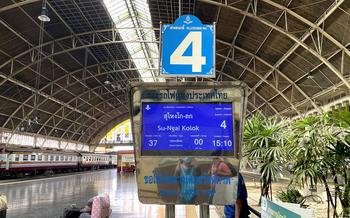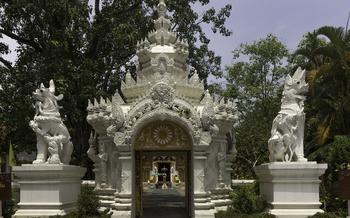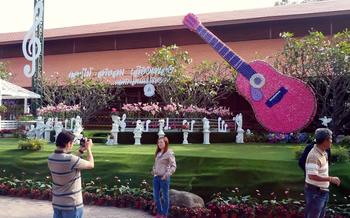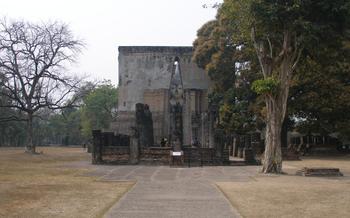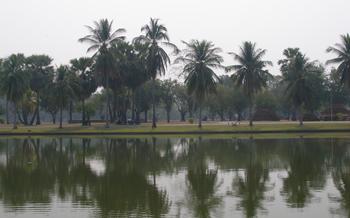
The Little Elephant Training Center
- The Little Elephant Training Center: An Overview
- Elephant Care and Conservation
- Elephant Behavior and Communication
- Elephant Training Techniques
- Elephant Shows and Performances
- Elephant Trekking and Riding
- Elephant Bathing and Interaction
- Learning from the Mahouts
- Educational Programs and Workshops
- Volunteer Opportunities
- Local Culture and Traditions
- Accommodation and Dining Options
- Getting There and Transportation
- Public Transportation
- Private Transfers
- Guided Tours
- Estimated Travel Time and Cost
- Best Time to Visit
- Insider Tip: Unveiling the Elephant Sanctuary's Hidden Gem
The Little Elephant Training Center: An Overview
The Little Elephant Training Center is a unique and ethical elephant sanctuary located in the heart of Phrae, Thailand. Founded in 2005 by a group of passionate individuals dedicated to elephant welfare, the center has become a haven for rescued and orphaned elephants, providing them with a safe and nurturing environment to thrive.
The center's philosophy is rooted in the belief that elephants are highly intelligent and emotional beings, deserving of respect and compassion. Through positive reinforcement training methods, the mahouts (elephant keepers) at the center establish strong bonds with the elephants, enabling them to learn various commands and tricks without the use of force or punishment.
The Little Elephant Training Center is a truly special place where visitors can learn about elephant behavior, conservation, and the importance of ethical treatment. With its commitment to animal welfare and the preservation of Thailand's rich elephant heritage, the center offers an unforgettable and transformative experience for all who visit.
Ethical Considerations and Animal Welfare Practices
The Little Elephant Training Center places the utmost importance on the ethical treatment and welfare of its elephants. All training methods employed are based on positive reinforcement, ensuring that the elephants are never subjected to physical punishment or abuse. The center also follows strict guidelines to ensure the elephants' physical and mental well-being, including providing them with a nutritious diet, ample exercise, and regular veterinary care.
By adhering to the highest ethical standards, the center not only provides a safe haven for its resident elephants but also sets an example for other elephant sanctuaries and tourist attractions in Thailand. Visitors can rest assured that by visiting the Little Elephant Training Center, they are supporting an organization that is truly dedicated to the well-being of these majestic animals.
Elephant Care and Conservation
At the Little Elephant Training Center, the daily routine and care of the elephants are paramount. Their well-being is ensured through a meticulous schedule that includes proper nutrition, exercise, and socialization. Elephants are herbivores, and their diet consists mainly of grasses, fruits, and vegetables. The center provides a balanced diet that meets their nutritional needs, ensuring they receive the essential vitamins and minerals for optimal health.
Regular exercise is crucial for maintaining the elephants' physical fitness and mental stimulation. The center's expansive grounds offer ample space for the elephants to roam, graze, and engage in natural behaviors like bathing and playing. Socialization is an integral part of elephant life, and the center encourages interaction among the herd members. This helps maintain their social structure and strengthens their bonds with one another.
The center also plays a vital role in the rehabilitation and rescue of injured or orphaned elephants. These elephants receive specialized care and attention, and the center works closely with wildlife authorities to ensure their safe reintegration into the wild whenever possible. Additionally, the center collaborates with local communities to promote elephant conservation initiatives, raising awareness about the importance of protecting these gentle giants and their habitats.
Elephant Behavior and Communication
Elephants are highly social and intelligent animals with a complex social structure and family dynamics. At the Little Elephant Training Center, visitors have the opportunity to observe and learn about elephant communication through body language, vocalizations, and touch. Elephants use a variety of body postures, ear movements, and trunk gestures to communicate with each other. They also produce a wide range of vocalizations, including rumbles, trumpets, and screams, to express emotions, convey intentions, and maintain social bonds.
By observing elephants in their natural environment, visitors can gain a deeper understanding of their behavior and communication. They can learn to recognize signs of distress, contentment, and playfulness, and to appreciate the importance of respecting and understanding elephant behavior. This knowledge helps to foster a deeper connection with these magnificent animals and promotes responsible and ethical interactions with them.
Elephant Training Techniques
The Little Elephant Training Center follows humane and positive reinforcement methods to train elephants. The training program emphasizes trust, obedience, and cooperation between elephants and their mahouts. Key principles of operant conditioning and reward systems are employed to encourage desired behaviors. Training exercises and activities focus on developing specific skills, such as following commands, performing tricks, and responding to verbal and visual cues. Patience, consistency, and positive relationships are essential components of successful elephant training. The center promotes a training philosophy that respects the natural intelligence and sensitivity of elephants, aiming to build strong and lasting partnerships between elephants and their handlers.
Elephant Shows and Performances
At The Little Elephant Training Center, showcasing elephant skills and abilities through performances is a way to celebrate their intelligence, trainability, and natural talents. Visitors can witness these impressive demonstrations, which include tricks, stunts, and choreographed routines that showcase the strong bond between elephants and their mahouts.
The center follows strict protocols to ensure the well-being and safety of elephants during performances. The elephants are not forced or coerced into participating, and the routines are designed to be enjoyable and stimulating for them. The performances are also educational, as they provide insights into elephant behavior, communication, and their remarkable abilities.
As a responsible tourist, it is important to be mindful of audience etiquette and to respect the elephants' needs. Avoid using flash photography, as it can be disturbing to the elephants, and refrain from making loud noises or sudden movements that may startle them. By following these guidelines, you can contribute to a positive and enjoyable experience for both the elephants and the audience.
Elephant Trekking and Riding
At the Little Elephant Training Center, visitors have the opportunity to explore the surrounding landscapes on guided elephant treks. These treks offer a unique and immersive experience, allowing participants to connect with nature and witness the beauty of the Thai countryside from a unique perspective. However, it is essential to ensure that elephant trekking is conducted ethically and with the welfare of the animals in mind.
Avoid harmful riding techniques that can cause discomfort or injury to elephants. Instead, opt for trekking operators that prioritize the well-being of their animals and use humane practices. Look for companies that employ experienced mahouts who treat their elephants with respect and compassion.
Before embarking on an elephant trek, inquire about the company's policies and practices. Ensure that the elephants are well-cared for, have adequate rest periods, and are not overworked. Choose operators who provide proper training for their mahouts and prioritize the safety and comfort of both the elephants and their riders.
By choosing responsible elephant trekking operators, you can contribute to the preservation of these majestic animals and ensure that their welfare is protected. Remember, ethical elephant trekking is not only about enjoying a unique experience but also about respecting and protecting these gentle giants for future generations.
Elephant Bathing and Interaction
At the Little Elephant Training Center, visitors have the extraordinary opportunity to engage in a truly unforgettable experience – bathing and interacting with elephants in their natural surroundings. Immerse yourself in the joy of connecting with these gentle giants as you gently bathe them in the refreshing waters of the river. Learn the proper techniques for interacting with elephants to earn their trust and respect.
Safety is paramount, and experienced guides will provide comprehensive guidelines for ethical elephant interactions. Embrace this unique chance to bond with these magnificent creatures, observing their playful nature and experiencing the pure joy of playing and bathing with them. The memory of this intimate encounter will undoubtedly be etched in your heart forever.
Learning from the Mahouts
The mahouts, or elephant handlers, at the Little Elephant Training Center play a crucial role in the care and training of the elephants. They possess a wealth of traditional knowledge, skills, and techniques passed down through generations, ensuring the well-being and safety of these magnificent animals. Mahouts form deep bonds with their elephants, based on trust, respect, and understanding.
Visitors to the center have the opportunity to interact with the mahouts, learn about their unique relationship with the elephants, and witness their expertise firsthand. Mahouts are always willing to share their insights and experiences, providing visitors with a deeper understanding of elephant behavior and training methods.
Through demonstrations and hands-on activities, visitors can learn about the various commands and signals used to communicate with elephants, as well as the importance of positive reinforcement and reward-based training. They can also observe the mahouts as they work with the elephants, demonstrating their skills in guiding, bathing, and grooming these gentle giants.
Interacting with the mahouts and learning from their traditional wisdom is an invaluable experience that offers visitors a unique perspective on the world of elephants and the deep connection between humans and these incredible creatures.
Educational Programs and Workshops
The Little Elephant Training Center offers a range of educational programs and workshops designed to engage visitors of all ages and backgrounds. These interactive sessions provide an opportunity to delve deeper into the world of elephants, their biology, behavior, and conservation challenges.
Participants can learn about elephant anatomy, physiology, and unique characteristics that set them apart from other animals. They can also explore the complex social structure of elephants, their family dynamics, and communication methods. Through hands-on activities and demonstrations, visitors gain a deeper understanding of elephant behavior and the importance of respecting their natural instincts.
The center's workshops also focus on promoting responsible tourism and ethical interactions with elephants. Visitors are taught about the negative impacts of unethical elephant riding and trekking practices, and encouraged to choose tour operators that prioritize animal welfare. They learn about the importance of supporting local communities and initiatives that work towards the conservation and protection of elephants.
By participating in these educational programs and workshops, visitors can become more informed and responsible travelers, contributing to the long-term conservation of elephants and their habitats.
Volunteer Opportunities
The Little Elephant Training Center offers a unique opportunity for visitors to volunteer and actively participate in the care and conservation of elephants. Volunteers play a crucial role in supporting the center's mission by contributing to various tasks and activities.
Volunteers are involved in a range of responsibilities, such as preparing and feeding elephants, assisting with their daily care and exercise routines, and observing and monitoring their behavior. They also participate in enrichment activities designed to stimulate the elephants mentally and physically, such as providing them with toys and interactive games.
The duration of volunteer work can vary from a few days to several months, depending on the individual's availability and commitment. Volunteers are expected to work alongside the center's staff and mahouts, learning from their expertise and gaining hands-on experience in elephant care and training.
To become a volunteer, individuals should have a genuine love and respect for elephants, a willingness to work hard, and a commitment to animal welfare. Prior experience with elephants is not necessary, as training and guidance are provided by the center's staff.
Volunteering at the Little Elephant Training Center is a rewarding and enriching experience that allows participants to make a meaningful contribution to elephant conservation while gaining valuable insights into the lives and behavior of these amazing animals.
Local Culture and Traditions
The Phrae region is steeped in a rich cultural heritage and vibrant traditions that revolve around elephants. Visiting local markets, temples, and historical sites offers a glimpse into the local way of life and the deep connection between elephants and the community. The annual Elephant Festival, held in November, is a must-see event showcasing traditional elephant parades, cultural performances, and blessings. Interacting with local communities allows visitors to experience the authentic Thai culture while learning about the role of elephants in shaping the region's identity.
Accommodation and Dining Options
When planning your visit to the Little Elephant Training Center, you'll have a range of accommodation options to choose from. For a truly immersive experience, consider staying in a local homestay or guesthouse. These accommodations offer a chance to connect with the local community and learn about their way of life. Homestays typically provide basic but comfortable rooms, while guesthouses often have more amenities like private bathrooms and air conditioning.
For dining, there are several restaurants and local eateries near the center serving traditional Thai cuisine. Don't miss the opportunity to try some of the local specialties, such as khao soi (a northern Thai curry noodle soup), sai ua (northern-style sausage), and khanom jeen (rice noodles with various toppings). For a more authentic experience, venture into the local markets, where you can find fresh produce, street food stalls, and delicious snacks.
Getting There and Transportation
Reaching the Little Elephant Training Center from major cities in Thailand is relatively easy and convenient. Several transportation options are available to suit different preferences and budgets.
Public Transportation
For a more immersive experience, travelers can opt for public transportation. Regular buses and trains connect Phrae to other major cities, such as Bangkok and Chiang Mai. Once in Phrae, local buses or tuk-tuks can be taken to the center, which is located about 15 kilometers from the city center.
Private Transfers
For a more comfortable and direct journey, private transfers can be arranged through the center or local tour operators. These transfers usually include door-to-door service, ensuring a hassle-free arrival at the center.
Guided Tours
For those who prefer a comprehensive and organized experience, guided tours are available from various tour operators. These tours often include transportation, activities, meals, and accommodation, making it a convenient option for visitors who want to make the most of their time in Phrae.
Estimated Travel Time and Cost
The travel time and cost to reach the Little Elephant Training Center can vary depending on the chosen transportation option and distance from the starting point. On average, the journey from Bangkok to Phrae takes about 10-12 hours by bus or train. The cost for public transportation ranges from 300 to 500 baht, while private transfers typically cost around 1,500 to 2,000 baht. Guided tours, including transportation, activities, and accommodation, can range from 2,000 to 3,000 baht per person.
Best Time to Visit
The best time to visit The Little Elephant Training Center and Phrae is during the cool and dry season, from November to February. During these months, the weather is pleasant and sunny, making it ideal for outdoor activities and elephant trekking. The center is less crowded during this time, allowing for a more intimate and personalized experience with the elephants.
Avoid visiting during the rainy season, from July to October, as heavy rainfall can make the trails muddy and slippery, and some activities may be canceled due to weather conditions. The peak tourist season in Thailand, from December to January, can also be crowded, so it's best to visit outside of these months for a more tranquil experience.
Plan your visit to coincide with local festivals and events related to elephants, such as the Elephant Round-up Festival in November, where you can witness a spectacular parade of decorated elephants. Keep in mind that during these festivals, the center may be busier, so it's advisable to book your visit in advance.
Insider Tip: Unveiling the Elephant Sanctuary's Hidden Gem
Beyond the captivating performances and interactions at the Little Elephant Training Center, a hidden gem awaits those seeking a deeper connection with these gentle giants. Nestled amidst the lush forests of Phrae lies a secluded elephant sanctuary, where injured, orphaned, or retired elephants find solace and rehabilitation. Visitors can embark on a guided tour of this sanctuary, witnessing the remarkable work done to provide these magnificent creatures with a safe haven. Learn about the elephants' individual stories, observe their rehabilitation process, and contribute to their well-being through donations or volunteer opportunities. This unique experience offers a profound insight into the sanctuary's dedication to elephant conservation and welfare, leaving visitors with a lasting impression of the profound bond between humans and elephants.

